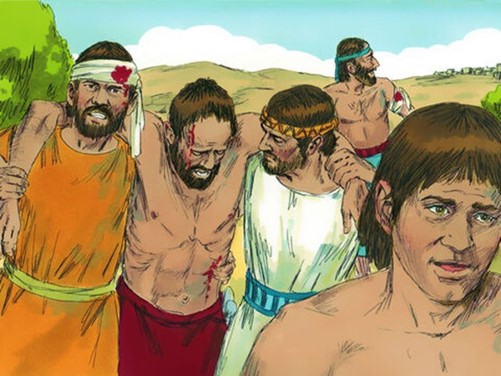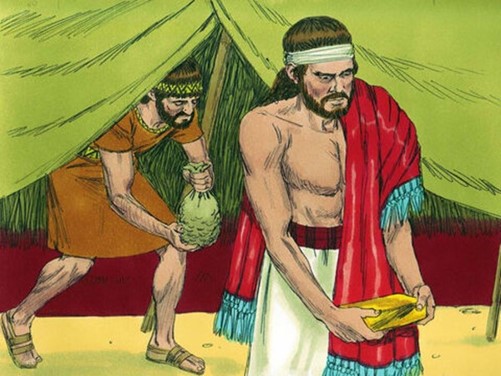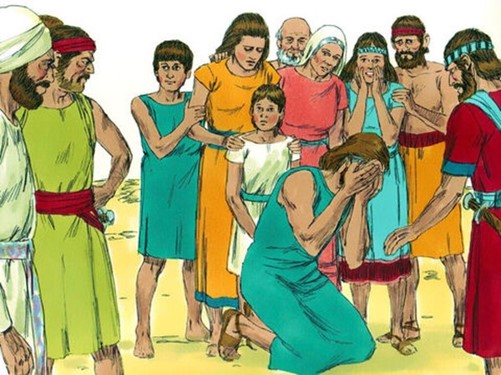Good morning!
Greetings in the name of the Father, the Son, and the Holy Spirit.
Whoever conceals their sins does not prosper, but the one who confesses and renounces them finds mercy. (Proverbs 28:13)

In Joshua 7, the narrative pivots sharply from triumph to tragedy, presenting a sobering lesson on the consequences of sin. Following their miraculous victory at Jericho, the Israelites, now confident in their military prowess, advance to Ai. However, their expected success turns to defeat, unveiling not a failure of strategy or strength but the presence of sin within their midst. Achan, in direct violation of God’s command, covertly takes items from Jericho meant for destruction, concealing them among his belongings. This act of disobedience does not remain isolated; its repercussions ripple through the entire community, leading to the loss of lives and a stinging defeat.
This Ai story starkly illustrates the profound truth that sin, especially when hidden, harbors the potential to affect more than the individual—it impacts the collective body. The story of Achan serves as a potent reminder of the weight of our actions, the critical nature of obedience to divine directives, and the interconnectedness of our spiritual health with the well-being of our broader community. It calls us to reflect on the hidden areas of our own lives that may need to be brought into the light, emphasizing the necessity for personal integrity and collective vigilance in maintaining the holiness and unity of God’s people.

The Gravity of Disobedience
In the account of Joshua 7:1, we encounter a stark warning about the nature of sin and its consequences. The verse begins with a chilling introduction, “But the Israelites were unfaithful in regard to the devoted things; Achan son of Carmi, the son of Zimri, the son of Zerah, of the tribe of Judah, took some of them. So the Lord’s anger burned against Israel.” This moment marks a pivotal downturn for the Israelites, following their victory at Jericho—a victory that now seemed overshadowed by the sin of one man.
The sin of Achan is not merely an act of disobedience but a manifestation of the seductive power of sin described in James 1:14-15, “but each person is tempted when they are dragged away by their own evil desire and enticed. Then, after desire has conceived, it gives birth to sin; and sin, when it is full-grown, gives birth to death.” Achan’s act of taking forbidden items from Jericho vividly illustrates how temptation lures individuals away from adherence to God’s commandments, leading to grave consequences not only for the individual but for the community at large.
Achan’s disobedience stemmed from a moment of personal desire that led him away from God’s explicit commands. Despite the clear instructions not to take any items from Jericho, Achan saw, coveted, and took—actions that echo the sequence of temptation and sin outlined in James. His sin was rooted in desire, which when allowed to conceive, brought forth disobedience and ultimately, death.
This Bible narrative compels us to recognize the need for self-examination and accountability within the Christian community. Achan’s story is a sobering reminder that sin is not only an individual matter but has implications for the wider body of believers. It underscores the importance of maintaining vigilance over our hearts and actions, being mindful of how our personal desires can sometimes lead us away from the path God has set before us.
To apply the lessons learned from Achan’s sin, believers are encouraged to cultivate an environment of openness and accountability within their communities. This involves being honest about the temptations we face and seeking support from fellow believers in overcoming these challenges. The practice of confessing our sins to one another, as encouraged in James 5:16, not only fosters transparency but also facilitates healing and spiritual growth.
Moreover, facing temptation and the inclination to disobey requires us to lean on God’s strength, acknowledging our inability to overcome sin on our own. Ephesians 6:10-11 reminds us to “be strong in the Lord and in his mighty power. Put on the full armor of God, so that you can take your stand against the devil’s schemes.” In doing so, we recognize that the battle against sin is waged not in our strength but through the power and grace of God.
In conclusion, the sin of Achan serves as a powerful lesson on the gravity of disobedience and the seductive nature of sin. It calls us to self-examination, accountability, and reliance on God’s strength to overcome temptation. By fostering open dialogue about the challenges we face and supporting one another in our spiritual walk, we can stand firm in our commitment to follow God’s commandments, thereby ensuring the health and unity of the Christian community.

The Ripple Effect of Sin
– Joshua 7:11-12: “Israel has sinned; they have violated my covenant, which I commanded them to keep. They have taken some of the devoted things; they have stolen, they have lied, they have put them with their own possessions.”
– 1 Corinthians 12:26: “If one part suffers, every part suffers with it; if one part is honored, every part rejoices with it.”
The narrative of Achan’s sin and its aftermath in Joshua 7 starkly illustrates the profound communal consequences of individual actions. Despite the victory at Jericho, Israel faces a humiliating defeat at Ai—a smaller, presumably weaker city than Jericho. They defeated Jericho not because they were strong, but God defeated the strong Jericho for the Israelites.
This unexpected setback reveals a deeper issue within the Israelite camp: the hidden sin of Achan. His personal transgression against God’s command directly leads to national defeat, loss of lives, and a significant blow to the morale of God’s people. This incident underscores the interconnectedness of the Israelite community, where the actions of one individual can have far-reaching effects on the whole.
The Community Affected by Individual Sin:
Achan’s decision to take the devoted things—explicitly forbidden by God—was not just a personal failure but a breach of the covenant with God that affected the entire community. The sin of one man brought judgment upon the entire nation, demonstrating the collective nature of sin and its consequences within the community of God’s people. This episode serves as a powerful reminder of our interconnectedness, as articulated in 1 Corinthians 12:26, where the well-being of each member affects the entire body of Christ.
If one member suffers, all suffer together; if one member is honored, all rejoice together. (1 Corinthians 12:26)
Communal Responsibility in the Faith Journey:
The story of Achan calls attention to the significant role of communal responsibility in our faith journey. It highlights the necessity for a community of believers to be vigilant not only about their personal walk with God but also about the spiritual health of their community. This vigilance involves creating an environment where sin is not only addressed but is done so constructively, with the aim of restoration and healing. The goal is not to castigate but to correct, not to shame but to share the burden of repentance and redemption.
Fostering an Environment for Constructive Addressing of Sin:
Creating such an environment requires grace, truth, and a commitment to the well-being of all members within the community. It involves practicing accountability with gentleness and respect, bearing one another’s burdens (Galatians 6:1-2), and encouraging one another towards love and good deeds (Hebrews 10:24). This approach ensures that when sin is addressed, it is done with the aim of bringing the individual back into fellowship with God and the community, emphasizing the redemptive power of Christ’s sacrifice.
Brothers and sisters, if someone is caught in a sin, you who live by the Spirit should restore that person gently. But watch yourselves, or you also may be tempted. Carry each other’s burdens, and in this way you will fulfill the law of Christ. (Galatians 6:1-2)
And let us consider how we may spur one another on toward love and good deeds, (Hebrews 10:24)
To apply these principles in our lives, we must:
- Practice Accountability: Engage in honest, open relationships where we can confess our sins to one another and pray for each other.
- Pursue Restoration: When sin is revealed within the community, work towards restoration with a spirit of gentleness, keeping in mind the ultimate goal of reconciling the individual with God and the community.
- Educate on the Impact of Sin: Teach about the communal impact of individual sins, reinforcing our collective responsibility towards maintaining the purity and unity of the body of Christ.
The ripple effect of Achan’s sin serves as a somber lesson on the impact of our actions on the broader community. It reminds us of our communal responsibility and the need to foster an environment where sin is addressed constructively, and restoration is actively pursued. In doing so, we not only uphold the integrity of our community but also reflect the redemptive heart of God towards His people.

Restoration Through Repentance
– Joshua 7:19-26 details the somber process of Achan’s confession and the severe consequences that follow his disobedience, marking a profound moment of both judgment and revelation in Israel’s journey.
– 1 John 1:9 offers a New Testament perspective on confession and forgiveness: “If we confess our sins, he is faithful and just and will forgive us our sins and purify us from all unrighteousness.”
The story of Achan is a poignant illustration of the destructive power of sin and the critical need for repentance. After the defeat at Ai, Joshua seeks God’s guidance, leading to the revelation of Achan’s sin. Achan’s confession, prompted by Joshua’s interrogation, reveals not only the hidden sin but also the heavy toll it took on the community. His acknowledgment of taking forbidden items from Jericho—despite God’s clear command to abstain—underscores a vital biblical principle: confession is the first step toward restoration.
The Gravity of Confession:
Achan’s confession, though it comes in the face of impending judgment, serves as a crucial reminder of the power and necessity of admitting our wrongdoings. It is a testament to the biblical truth that sin cannot remain hidden (Numbers 32:23) and that confession is necessary for the healing process to begin. Achan’s story, while ending tragically, points to the opportunity for mercy and restoration available to those who confess their sins.
“But if you fail to do this, you will be sinning against the Lord; and you may be sure that your sin will find you out. (Numbers 32:23)
God’s Justice and Mercy:
This narrative emphasizes God’s justice, demonstrating that sin has consequences not only for the individual but for the entire community. However, it also aligns with the broader biblical narrative that highlights God’s willingness to forgive and restore those who come to Him in repentance. 1 John 1:9 encapsulates the promise of forgiveness and purification for those who confess their sins, highlighting God’s unfailing mercy and justice.
If we confess our sins, he is faithful and just and will forgive us our sins and purify us from all unrighteousness. (1 John 1:9)
Bible teaches us to see repentance not as an admission of defeat but as a pathway to freedom and restoration. Confession, both to God and within the community, serves as a powerful means of reconciliation and healing. It is through acknowledging our sins and seeking forgiveness that we can experience the fullness of God’s grace and mercy.
To achieve this, we need to practice in God:
- Personal Reflection: Regularly examine your heart and actions, identifying areas where you may have fallen short of God’s commands. Use the discipline of confession as a tool for spiritual growth and renewal.
- Seek Forgiveness: Where possible, seek forgiveness from those you have wronged. This act of humility can lead to healing and restoration in relationships.
- Foster a Culture of Grace: Encourage an environment where individuals feel safe to confess their sins without fear of judgment. Emphasize God’s grace and the power of communal support in the journey toward repentance.
- Trust in God’s Mercy: Remember that God is always ready to forgive. His mercy is greater than any sin, and His desire is for His children to live in the freedom that comes from walking in His ways.
Achan’s story, while serving as a warning, also offers hope through the promise of restoration for those who repent. As believers, we are called to embrace repentance, trusting in God’s unfailing love and forgiveness. Let us move forward with the assurance that our confessions are met with God’s grace, leading us toward healing and wholeness in Him.
Summary and Life Application:
Joshua 7 offers a profound exploration into the nature of sin, its communal ramifications, and the redemptive power of repentance. The narrative of Achan’s transgression serves not only as a stark warning about the perils of disobedience but also as a testament to the interconnectedness of our spiritual lives within the broader faith community. This chapter vividly illustrates that our individual actions, particularly those hidden in disobedience, can lead to consequences that ripple through our families, friendships, and congregations, undermining the collective faith and mission.
The story underscores a pivotal biblical principle: the necessity of living lives marked by transparency and accountability. It invites us to examine our hearts and actions, to bring our sins into the light of God’s mercy, and to seek His strength in areas where we fall short. By doing so, we not only embrace personal healing but also contribute to the health and vitality of our communities.
Furthermore, Joshua 7 encourages us to cultivate an environment where confession and repentance are valued and where individuals can find support and grace in their journey towards wholeness. This involves creating spaces where stories of failure and forgiveness are shared, not as tokens of shame, but as milestones of God’s enduring grace and transformative power.
As we reflect on Achan’s story, let us commit to fostering a culture within our faith communities that prioritizes spiritual accountability, encourages open confession, and actively seeks restoration. Let this narrative remind us of our responsibility to one another and the power of communal faith in navigating the challenges of life. In doing so, may we find strength in God’s promise of forgiveness and grace, assured that through repentance, we can overcome the barriers that sin erects, restoring our relationship with God and with one another.
Let’s pray together. Lord, help us to recognize the gravity of our sins and the impact they have on those around us. Grant us the courage to confess and repent, and the wisdom to support each other in our journey towards holiness. May we lean on Your strength to resist temptation and live lives that honor You. In Jesus’ name, Amen.

Brothers and sisters, if someone is caught in a sin, you who live by the Spirit should restore that person gently. But watch yourselves, or you also may be tempted. (Galatians 6:1)
